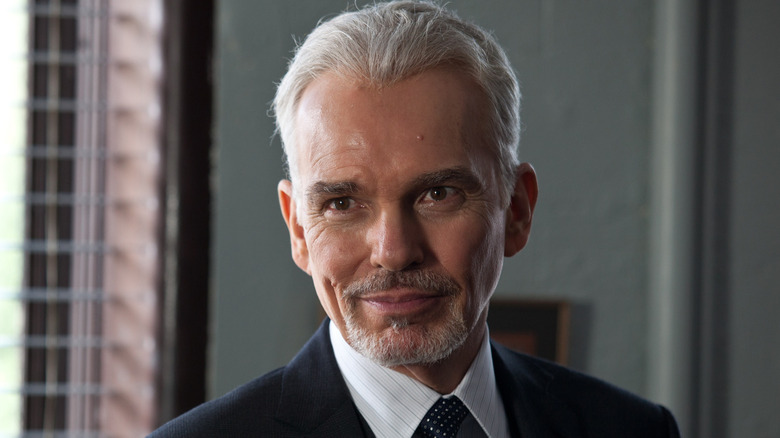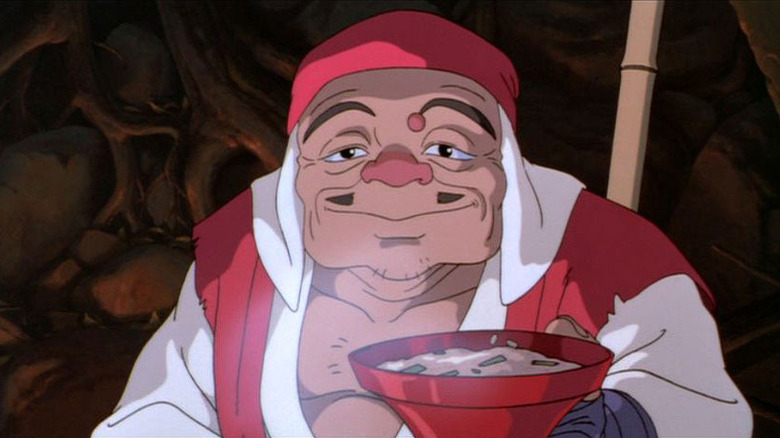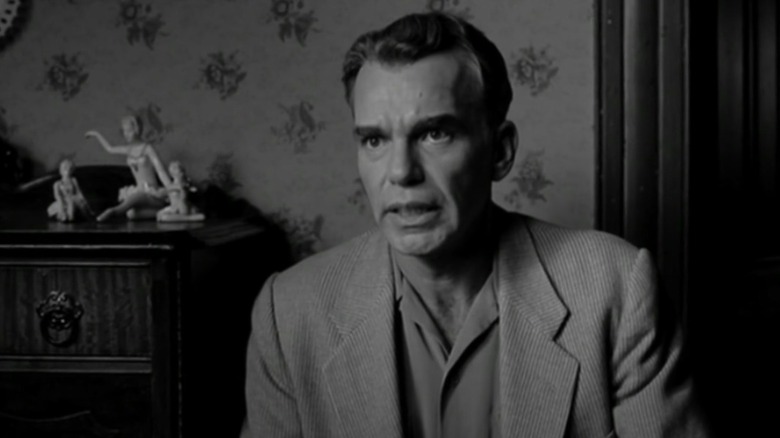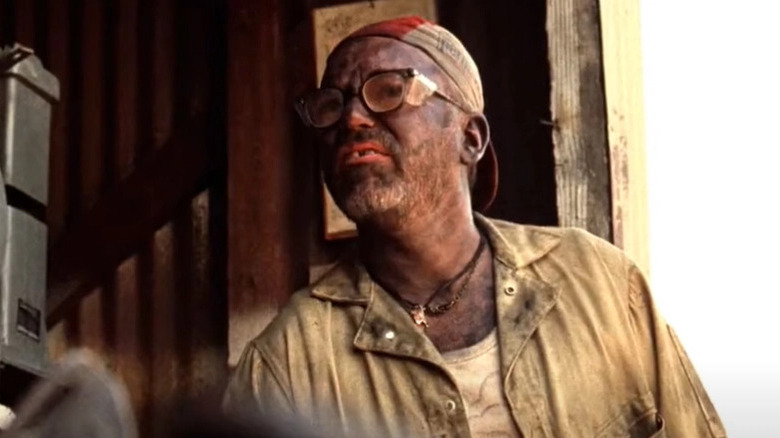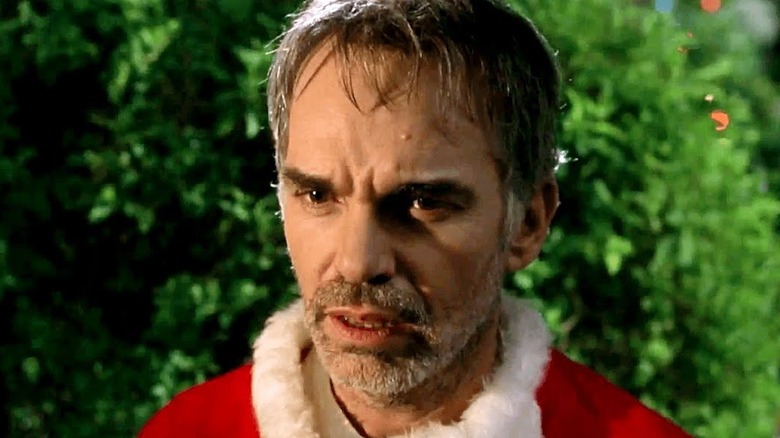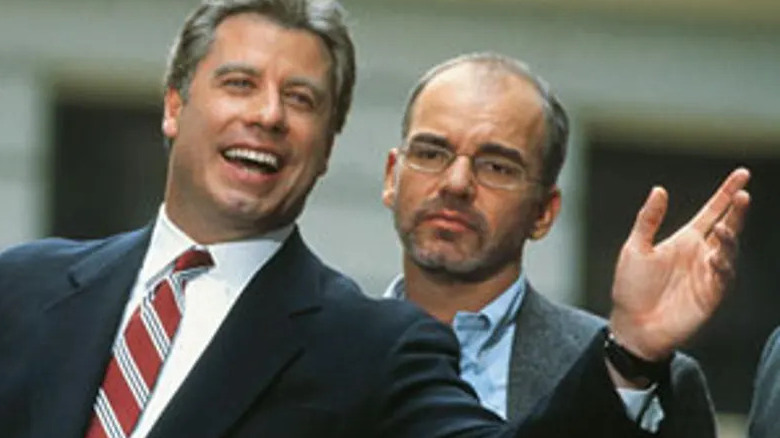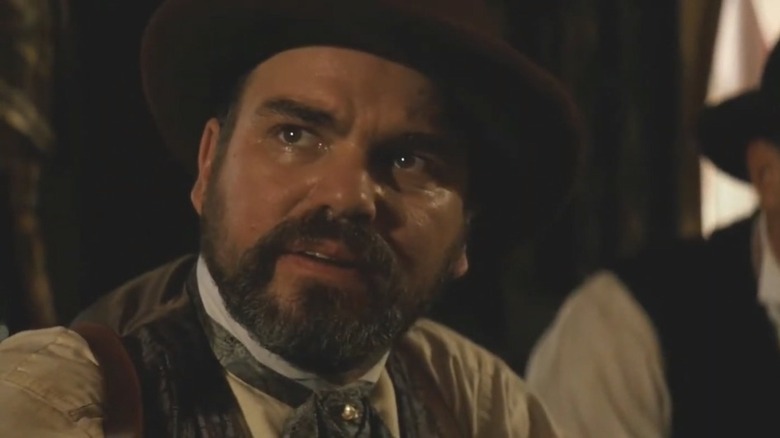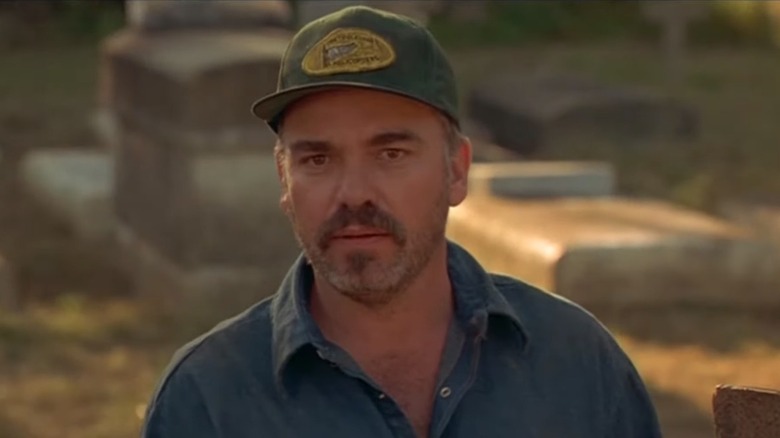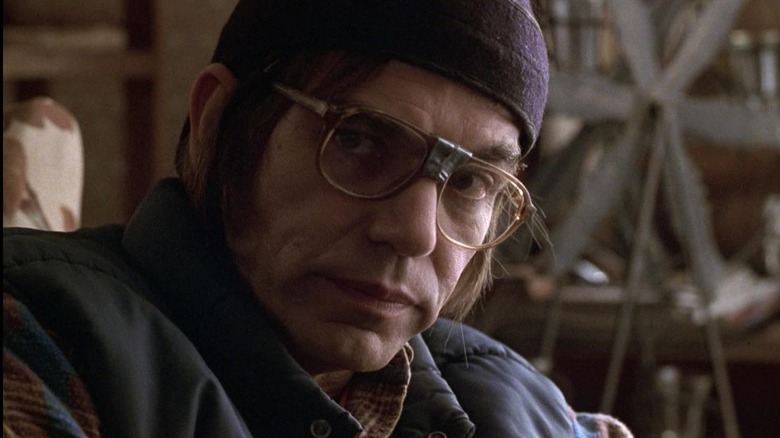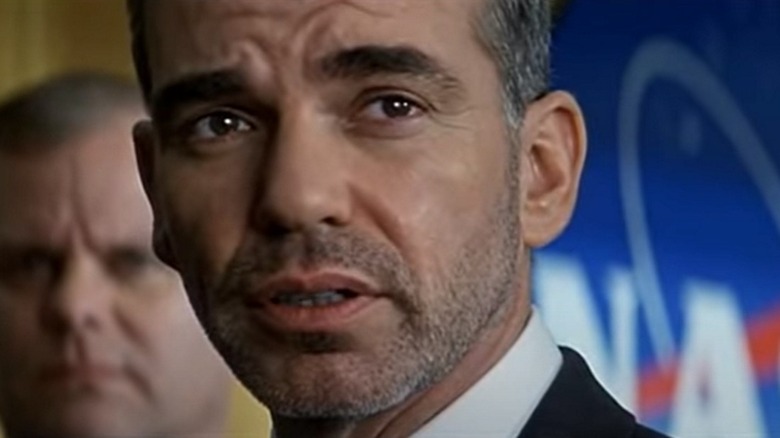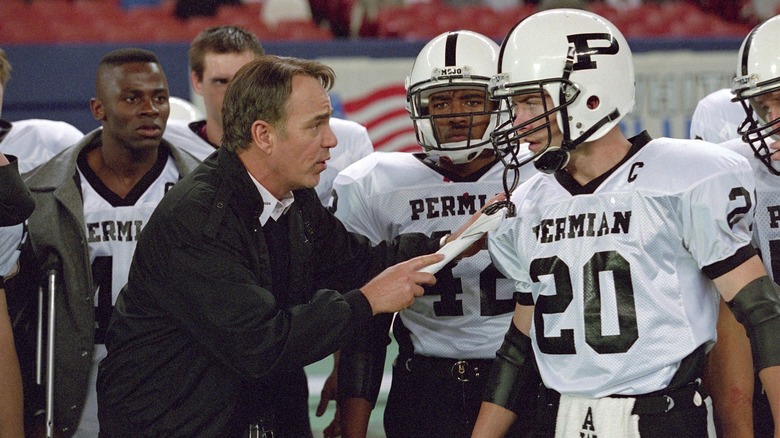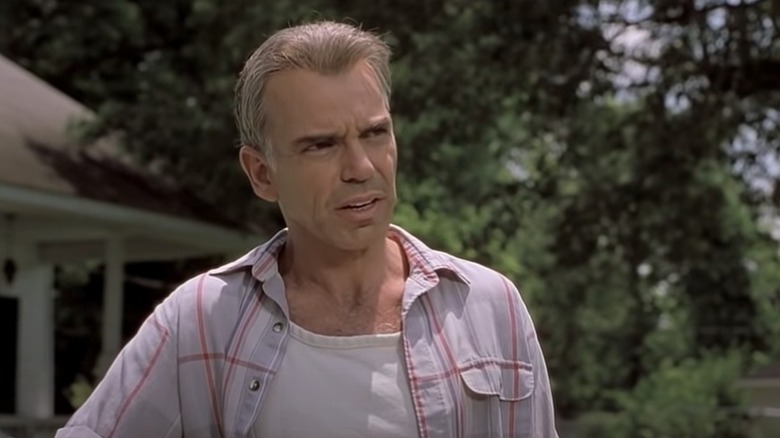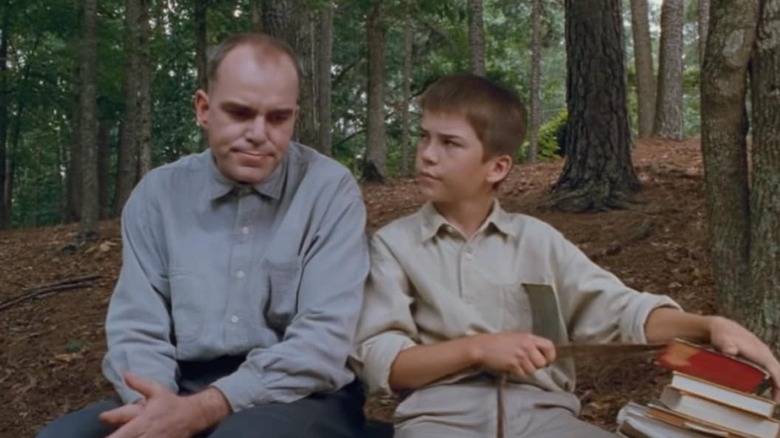The 12 Best Billy Bob Thornton Movies, Ranked
In "The Grey Man," the Russo brothers' latest expansive (and expensive) collaboration with screenwriters Christopher Markus and Stephen McFeely, Billy Bob Thornton gets the "and" credit. That's fitting in terms of screentime, but it doesn't capture what Thornton brings to the film. His presence is the skeleton key to unlocking Marcus, McFeely, and the Russos' intentions. Thornton was one of the 1990s most prominent talents, a force in front of and behind the camera — sometimes in the same picture. "The Grey Man" deliberately rips its espionage and quip-to-dialogue ratio from the decade that made Thornton famous. Thornton gets this. He calibrated his whole performance as Donald Fitzroy — from its winking elements to sincerest stretches — knowing what "The Gray Man" is after. It's smooth. It's electric. That's peak Billy Bob Thornton.
Thornton has rarely stopped working or ceased being smooth or electric since his heyday more than two decades ago. He's been crushing it on television and in the world of country music. All the same, his filmography is due for some appreciation. The best Billy Bob Thornton movies, like the star himself, are effortless miracles that crackle with dark, deeply smart energy. Here are the 12 best Billy Bob Thornton movies, ranked.
12. Princess Mononoke
Billy Bob Thornton's voice is unmistakable. The actor's Southern drawl (which he rarely masks) and baritone pitch are laden with honey and gravitas. There's nothing casual about Thornton's speech, but his every word being easy on the ears is a secret weapon that makes high-stakes storytelling go down easy. Given that, it's a wonder Thornton hasn't done more voice-over work. One of his few contributions to the art is a sterling film and testament to his talents: Hayao Miyazaki's unusually violent, reliably human "Princess Mononoke."
Miyazaki's breakthrough film was ranked one of his five best efforts by SlashFilm in 2014. It's only become more resonant with time. The film's titular character is a modern icon, a woman who (in the parlance of Clarissa Pinkola Estés' legendary feminist text) runs with wolves. Mononoke is feral. At no point during the film is she forced to compromise her wildness for the sake of others, and the movie makes space for her full-throated feelings to be a feature of her heroism, not a bug. It's hard to imagine recent hits like "Yellowjackets" and "She-Hulk" without her. It's also impossible to imagine the film's English dub without Thornton, who uses his role as the crafty monk Jiko-bô to ground the movie's expansive and magical world-building through recognizable vocal naturalism. The film wouldn't have as solid a foundation from which to soar without him. It belongs in his essential canon.
11. The Man Who Wasn't There
It's a tribute to how reliably incredible Joel and Ethan Coen are that "The Man Who Wasn't There" ranks in the bottom half of Slash Film's "Best Coen Brothers Films" list. While it's hardly the brothers' best work, the Roger Deakins-shot black and white noir experiment is excellent. It compellingly asks if a crackerjack crime story can be centered on a lethargic protagonist largely absent from his existence. The answer, in fits and starts, is yes. Yet, it's hard to imagine that answer being realized effectively by any other actor than Billy Bob Thornton.
Thornton plays Ed Crane, a small-town barber whose distinguishing personality traits are chain-smoking and a thousand-yard stare. Nothing seems to phase him — not his job and not his wife, Doris (Francis McDormand), who may be having an affair with her boss, Big Dave (James Gandolfini). When Ed becomes embroiled in a series of deceptions and violent acts, he doesn't exactly come alive so much as he has his stoicism reframed. Ed, it turns out, is an unreliable narrator unlike any other. Thornton keeps the light flickering behind Ed's eyes, foreshadowing twists through loaded glances and gestures. When the movie's plot shifts into a higher gear, the emotional layers of Thornton's work unfurl spectacularly.
10. U-Turn
By and large, "character actor" is an umbrella term for "not leading man." Despite several compelling and essential leading roles, Patton Oswalt is a character actor. Ryan Gosling is a leading man whose roles in "The Nice Guys" and "The Believer" seem like the work of two different performers. Billy Bob Thornton's work exists in the grey area between leading man and character actor, and he forces audiences to consider if those labels are useful. The most radical example of that comes in Oliver Stone's lurid crime drama "U-Turn."
Caked in grease and wearing a pair of frequently fogged glasses, Thornton is unrecognizable as Darryl, a mechanic with sinister intentions for Sean Penn's Bobby. Stone harnesses Thornton's penchant for unconventional choices and unleashes them wildly. Darryl is as likely to dispense Forrest Gump-like folksy wisdom as ruining someone's life. He does both in one scene. Thornton is never shy about taking roles in which he's transformed, but as Darryl, his is near-mythic and elemental. Not every actor can achieve that, leading man or otherwise.
9. Bad Santa
"Bad Santa" began the badly behaved phase of Billy Bob Thornton's career. After the actor played foul-mouthed safecracker Willie T. Soke in Terry Zwigoff's Molotov cocktail of a comedy, he starred as a hard-drinking coach in Richard Linklater's "The Bad News Bears" remake. Thornton also appeared as lovable but unsavory characters in "School For Scoundrels" and the improbably titled Craig Gillespie movie, "Mr. Woodcock." None of them compare to "Bad Santa." Those films, ironically, prioritize the bad behavior of Thornton's characters over actual character study — and that's not the case with "Bad Santa."
Though the movie kicked off a series of "Bad" imitators ("Bad Teacher," "Bad Moms," and "A Bad Moms Christmas"), it's primarily invested in exploring the merits and failings of tough love. Zwigoff and Thornton are interested in discovering whether a man as morally corrupt as Willie can still make a difference in someone's life. The answers make "Bad Santa" a film with lasting resonance. Thornton forces the audiences to consider who they're willing to have affection for and the benefits of love that is harsh and unsentimental. Though Thornton would go on to operate in that modality for the next few years, he would never do so more effectively. Willie belongs on his Mount Rushmore of notable roles, and through Willie, "Bad Santa" genuinely imagines the influence of a mythological figure whose mischief is more in line with his myth. None of this movie's imitators can't approach it.
8. Primary Colors
If "Bad Santa" finds Thornton operating in "bad behavior" mode, "Primary Colors" offers the opposite. Mike Nichols' incendiary political satire is ultimately a triumph of optimism, a movie that encourages holding onto and fostering political idealism despite our elected officials' flawed characters. Much of this runs through Billy Bob Thornton's Richard Jemmons, a James Carville stand-in who has endured the weight of political disappointments and chooses President Jack Stanton (John Travolta) because his emotional intelligence outweighs his moral failings. To be clear, there are many of them. Stanton is largely modeled after Bill Clinton and possesses the 42nd president's predilection for marital infidelity. Jemmons still finds him worthy of the office. That's the uneasy but necessary thesis that makes "Primary Colors" a must-watch.
Jemmons is weary of the political machine. There are times when he feels chained to it. He participates nonetheless, believing that change is possible. Other actors might have mined the role for sentimentality. Thornton doesn't. He (and Jemmons) are clear-eyed, despite how uncomfortable that 20/20 vision is. That subtle choice has helped "Primary Colors" age beautifully and makes it one of Thornton's most notable films.
7. Tombstone
Tombstone is not a movie for Western genre heads. It's broad stroke mythology for the rest of us. "Tombstone" manages to play fast and loose with facts and genre conventions without ever becoming post-modern or self-referential. It's both a deeply serious and a supremely silly picture.
You need only look to Billy Bob Thornton's performance for proof. Even in an ensemble that includes Kurt Russell, Val Kilmer, Sam Elliot, and so many more, Thornton makes an indelible impression as the slap-happy, poker-playing Johnny Tyler. Tyler is boisterous and bullying until he encounters Wyatt Earp (Russell), who memorably makes mincemeat of the two-bit crook by slapping the bravado out of him while spitting righteously silly dialogue like "Skin that smoke wagon and see what happens" and "You gonna do something or just stand there and bleed?" Tyler is not the only role through which Thornton would bring gravitas to the ridiculous ("Armageddon," "Bandits"), but it began that oeuvre on a sterling note. "Tombstone" is the ultimate contradiction, utterly of its time yet entirely old-fashioned. It's in the business of myth-making yet relaxed in its method.
6. The Apostle
Throughout his career, Billy Bob Thornton has excelled at playing characters who either keep the faith or have lost it altogether. He does the former in "Primary Colors" and "Armageddon" (which also makes an appearance on this list), but he distressingly embodies the latter in Robert Duvall's late-career marvel, "The Apostle." As the racist construction worker simply named Troublemaker, he presents the ideal, perfidious obstacle for Robert Duvall's Euliss F. "Sonny" Dewey, a man whose wife, Jessie (Farah Fawcett), is having an affair with a youth minister and whose conversations with God have grown stilted. Dewey is struggling to believe in himself, his marriage, his anything. His journey back to faith runs him straight through Thornton, who goes toe-to-toe with the legendary Duvall and holds his own.
He also crucially adds to the authentic Southern setting and atmosphere "The Apostle" cultivates. Hollywood tends to caricature the South. "The Apostle," Duvall, and Thornton don't. That's just one of many reasons to believe in and enjoy this movie.
5. A Simple Plan
There's a reason the role of Hank in "A Simple Plan" netted Thornton his third Oscar nomination. Embodying the film's "sometimes good people do evil things" tagline, Hank's arc is the heartbreaking and logical endpoint of Sam Raimi's Midwestern chiller, The role would have been a showcase for any thespian, but Thornton embodies it with more love and vulnerability than he's ever shown.
There's nothing simple about his performance, and it deserves every ounce of praise it gets — Just like "A Simple Plan," to be frank. Sam Raimi's second wave of crowd-pleasing genre films is chock full of pleasures: the Southern Gothic, "The Gift" and the brutal Western, "The Quick & The Dead." However, "A Simple Plan" might be its crown jewel. Raimi brings his flair for horror to noir, shooting the snow-covered Minnesota woods as if creatures will pop out of them at any given moment. In many ways, "A Simple Plan" is a monster movie about ordinary humans. There's nothing ordinary about it or Thornton's performance.
4. Armageddon
It's possible that "Armageddon" will be the film that Billy Bob Thornton is best remembered for, not because it's the best film he ever appeared in but because it's the most visible. Michael Bay's asteroid disaster epic is a pop-culture touchstone. It is also in the Criterion Collection, and while it sounds reductive to call any film a pop masterpiece, that's exactly what "Armageddon" is. It's perfect cinema that aspires to be nothing less than the most thrilling and ridiculous film you've ever seen.
Billy Bob Thornton isn't the star or even the most memorable element of "Armageddon." However, Thornton consistently gives the movie its emotional gravitas. He and Bruce Willis never act as if they're in a Michael Bay movie. Thornton is genuinely trying to save the world and making lines like "we drill" — as in "we drill into the surface of an asteroid using barely trained rig workers" — feverishly believable. Bay usually brings out actors' most hyperactive and steroidal tendencies. Thornton never gives into them. He is a contrapuntal tone that is essential to "Armageddon" and its lasting effectiveness.
3. Friday Night Lights
I named Peter Berg's "Friday Night Lights" the best football movie ever in an article for SlashFilm. It's also one of Billy Bob Thornton's best movies. In many ways, it's the antithesis of a great Billy Bob Thornton movie. In a tremendous profile for GQ Magazine, Thornton offers this sobering thought: "You're either born with it or you're not," he says, referring to the drive to create. "There aren't any people aligned with me passionately." You read that quote and realize Boy Bob Thornton is often playing the most driven person in any film in which he appears.
In "Friday Night Lights," a high school football team is as (if not more) driven as the coach Thornton plays. He's wise enough to modulate the players' hopes and dreams. They aren't. The results are exhilarating and devastating. This is what makes "Friday Night Lights" an enduring film. When "Friday Night Lights" is teaching Mike Winchell (Lucas Black) to be a leader or making space for the life-altering heartbreak James "Boobie" Mills (a career-best Derek Luke) encounters, it is more starkly human than your average sports movie. It's about young men who may or may not be born with it, who may or may not get to keep it. No wonder it stars Billy Bob Thornton.
2. Monster's Ball
The best Billy Bob Thornton movies aren't interested in easy answers. "Primary Colors" doesn't provide them. Despite its outlandish, unrealistic plotting, neither does "Armageddon" — it's a fantasy about human tenacity. Despite appearing in his share of blockbusters, Billy Bob Thornton doesn't seem to crave simple entertainment. And "Monster's Ball" is far from simple entertainment.
Best, remembered for Halle Berry's landmark Oscar win — and rightly so — "Monster's Ball" is a remarkably difficult movie. It is hard to watch. It is difficult to unpack. Even for a film that concerns itself with abusive parenting, death, and racism that's both macro and microaggressive, "Monster's Ball" packs a remarkable amount of pain into its run time. It does so, though, in the hopes of examining love and forgiveness to determine their tensile strength. Again, that's a theme Thornton has returned to throughout his career, but here, he cedes the stage to an ensemble of actors on the verge of breakouts or prestige breakthroughs. (Berry, Heath Ledger, Sean Combs). Acting is reacting, and in "Monster's Ball," Thornton's seemingly stoic but searing reactions not only add up to one of his finest performances, but they also prove he's one of Hollywood's great scene partners. That's important in any project, but especially in one as delicate and difficult as "Monster's Ball."
1. Sling Blade
"Sling Blade" isn't the best movie on this list, but it's impossible to call it anything less than the best Billy Bob Thornton movie. On every level, this movie doesn't exist without Thornton. Thornton wrote it. Thornton directed it. Thornton starred in it. He did all these things before he was a household name. Thornton had a host of solid Hollywood credits, but a flop, especially one that he wrote, directed, and starred in, could have halted that momentum altogether. "Sling Blade" was the equivalent of Thornton gambling his whole life and artistic well-being on one spin of the roulette wheel. "Sling Blade" lands.
Thornton is uncomfortably mesmerizing as Karl Childers, an intellectually disabled man who's been living in an Arkansas psychiatric hospital for much of his life. Thornton directs compelling performances by Lucas Black, J.T. Walsh, and especially Dwight Yokum, who has likely never been better on screen. Most notably, he creates a cinematic language for modern Southern cinema. You can trace the works of David Gordon Green ("Joe," "Undertow") and Jeff Nichols ("Take Shelter," "Mud") directly back to "Sling Blade," a movie that broke into the mainstream and made a previously unheard voice from the region come through loud and clear. "Sling Blade" is the Billy Bob Thornton movie, and it likely always will be.
